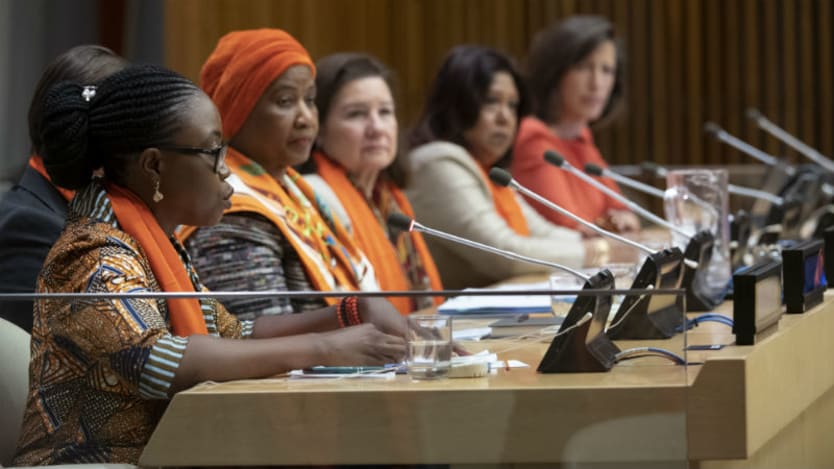
UNITED NATIONS — A flood of #orangetheworld social media posts — as well as orange-clad visitors to the United Nations — commemorated International Day for the Elimination of Violence Against Women on Monday, which aims to spread awareness about gender-based violence.
But what’s actually needed is investment in gender inequality, which is the root cause of violence against women and girls, according to Kalliopi Mingeirou, head of the Ending Violence Against Women Section of UN Women.
“We know evidence shows that campaigns are not enough and do not change the mentalities of people. They really do not work on their own. Now we know we have increasing evidence that violence against women is preventable, and we have some strategies that can work,” Mingeirou said in an interview with Devex.
“Violence against women and girls happens in a continuum. It is part of the same violence that women and girls face in their everyday lives.”
— Kalliopi Mingeirou, chief of Ending Violence Against Women Section, UN WomenThere is a need to increase work and funding related to prevention, Mingeirou said.
Approximately 35% of women worldwide have experienced physical or sexual violence at some point in their lives, but some national studies also show that up to 70% of women have experienced physical or sexual violence from an intimate partner, according to U.N. Women.
Mingeirou wants to see longer-term support for gender-based violence survivors, like housing and employment opportunities.
U.N. Secretary-General António Guterres has supported a survivor-focused response to sexual violence, in part through a 3-year-old trust fund. So far, it has generated about $2 million and is operating in three countries. Another entity, the UN Trust Fund to End Violence Against Women, has a portfolio of about $50 million. But more could be done to direct support to women-led civil-society organizations that address gender inequality and policy at the country level, Mingeirou said.
“There is a lot of attention and awareness. We have commitments, but they do not always have adequate resources to be materialized,” she said.
The UN Women-hosted commemoration on Monday focused on sexual violence in conflict — or what U.N. Special Representative of the Secretary-General on Sexual Violence in Conflict Pramila Patten called “history’s greatest silence.”
Ajna Jusić, president of the Forgotten Children of War Association, spoke Monday of her experiences as a child born of rape during the conflict in Bosnia and Herzegovina. Twenty-six years later, Jusić and her mother are still living with stigma, Jusić said. Her organization is advocating for measures to recognize children born of war as a vulnerable group with social protection services.
“Immediately after the war, people and survivors were left alone without any support. A dark cloud of trauma came over our country … There was no systematic move from the state to respond. All the shame was left on the women survivors,” Jusić said.
There’s a “big issue” with national laws on domestic and sexual violence, according to Mingeirou. Nearly 1 in 4 countries do not have laws on domestic violence, and only 41% of countries explicitly criminalize marital rape, Mingeirou explained. Enforcement remains a challenge.
“We still have some gaps in the area of laws, for sure, but the most important gap right now is the enforcement of such legislation,” Mingeirou said.
During her address at the U.N., Patten highlighted some areas of progress in addressing and preventing sexual violence in conflict, but also many of the lingering challenges, including those faced by U.N. peacekeeping forces.
“Peacekeepers are now systematically trained to detect, to deter, sexual violence as part of their operational readiness standards. Sexual violence has become an integral part of criminal investigations,” Patten said.
In November, judges at the International Criminal Court gave former Congolese rebel leader Bosco Ntaganda a historic 30-year sentence on 18 counts of war crimes, including rape and sexual slavery, Patten noted.
But U.N. peacekeeping also remains a “male-dominated domain,” according to Patten, with marginal representation of women in police and military units. And sexual violence in conflict remains a tactic used by state and nonstate armed groups, such as the Islamic State group.
“The international community has not yet adequately invested in the structural, root causes that perpetuate this violence, such as inequality. Women and girls are a critical agency for conflict prevention and peace building. Yet when former negotiations and transitional justice processes begin, they are too often marginalized and pushed out of the picture,” Patten said.
Mingeirou emphasized the need to link sexual violence in conflict to the “same phenomenon that women face at community and in their homes.”
“Violence against women and girls happens in a continuum. It is part of the same violence that women and girls face in their everyday lives,” she said. “We need to recognize that and work to prevent it.”




